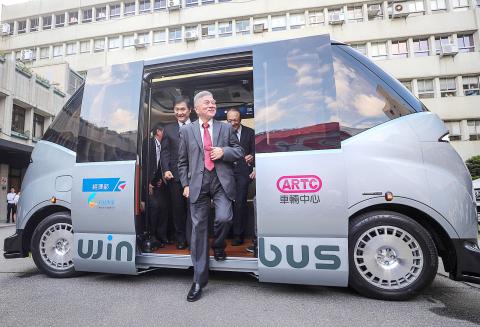The Ministry of Economic Affairs and the Automotive Research & Testing Center (ARTC, 車輛研究測試中心) yesterday unveiled the nation’s first domestically designed and developed autonomous minibus.
The minibus, christened Winbus, with “win” sounding similar to a Chinese word (穩) meaning “steady,” is Taiwan’s first step in the domain of highly automated vehicles, Minister of Economic Affairs Shen Jong-chin (沈榮津) told a news conference in Taipei.
The vehicle was developed with the help of local companies, including Gigabyte Technology Co (技嘉), which provided autonomous controllers, Acer ITS Inc (宏碁智通), which handled real-time kinematic applied GPS, Inventec Corp (英業達), which supplied cabin display modules, and Kingwaytek Technology Co (勤崴), which supports the autonomous driving system, the ministry said.

Photo: CNA
Winbus has Level 4 autonomous driving capabilities as determined by the US-based Society of Automotive Engineers, meaning no human intervention is needed, as the vehicle is capable of handling most situations, the ministry said.
“Several cities, counties and townships have shown interest in implementing the automated minibus in their transportation networks,” Shen said, adding that the ministry has approved several programs to launch the nation’s autonomous vehicle industry.
The Legislative Yuan passed the Unmanned Vehicles Technology Innovative Experimentation Act (無人載具科技創新實驗條例) on Nov. 30 last year, which allows companies to test autonomous vehicles with local government authorization, he said.
“We aim to begin sandbox testing of Winbus by the fourth quarter this year,” ARTC president Liao Ching-chiu (廖慶秋) said, adding that the center has already negotiated a sightseeing itinerary with the Changhua County Government that is to transport people from Lukang Tianhou Temple (鹿港天后宮) to the Changhua Coastal Industrial Park (彰濱工業區).
Winbus is most suitable for tourism use, as the vehicle is compact, meaning it can handle mountainous or crowded areas easily, but also spacious, as there is no steering wheels or pedals.
“We are negotiating with local authorities in Kaohsiung to use Winbus to transport people from metro stations to tramway stops,” ARTC chairman Joe Huang (黃隆洲) said.
Winbus could also be used to transport tourists to and from the city’s Love River (愛河), Huang said.

Taiwanese suppliers to Taiwan Semiconductor Manufacturing Co. (TSMC, 台積電) are expected to follow the contract chipmaker’s step to invest in the US, but their relocation may be seven to eight years away, Minister of Economic Affairs J.W. Kuo (郭智輝) said yesterday. When asked by opposition Chinese Nationalist Party (KMT) Legislator Niu Hsu-ting (牛煦庭) in the legislature about growing concerns that TSMC’s huge investments in the US will prompt its suppliers to follow suit, Kuo said based on the chipmaker’s current limited production volume, it is unlikely to lead its supply chain to go there for now. “Unless TSMC completes its planned six

Intel Corp has named Tasha Chuang (莊蓓瑜) to lead Intel Taiwan in a bid to reinforce relations between the company and its Taiwanese partners. The appointment of Chuang as general manager for Intel Taiwan takes effect on Thursday, the firm said in a statement yesterday. Chuang is to lead her team in Taiwan to pursue product development and sales growth in an effort to reinforce the company’s ties with its partners and clients, Intel said. Chuang was previously in charge of managing Intel’s ties with leading Taiwanese PC brand Asustek Computer Inc (華碩), which included helping Asustek strengthen its global businesses, the company

Power supply and electronic components maker Delta Electronics Inc (台達電) yesterday said second-quarter revenue is expected to surpass the first quarter, which rose 30 percent year-on-year to NT$118.92 billion (US$3.71 billion). Revenue this quarter is likely to grow, as US clients have front-loaded orders ahead of US President Donald Trump’s planned tariffs on Taiwanese goods, Delta chairman Ping Cheng (鄭平) said at an earnings conference in Taipei, referring to the 90-day pause in tariff implementation Trump announced on April 9. While situations in the third and fourth quarters remain unclear, “We will not halt our long-term deployments and do not plan to

The New Taiwan dollar and Taiwanese stocks surged on signs that trade tensions between the world’s top two economies might start easing and as US tech earnings boosted the outlook of the nation’s semiconductor exports. The NT dollar strengthened as much as 3.8 percent versus the US dollar to 30.815, the biggest intraday gain since January 2011, closing at NT$31.064. The benchmark TAIEX jumped 2.73 percent to outperform the region’s equity gauges. Outlook for global trade improved after China said it is assessing possible trade talks with the US, providing a boost for the nation’s currency and shares. As the NT dollar